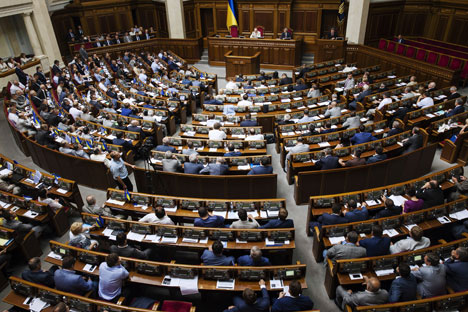
Verkhovna Rada has voted for a package of anti-corruption bills submitted for consideration by Ukrainian President Petro Poroshenko and the country’s government. Source: Photoshot / Vostok Photo
According to Moskovsky Komsomolets, a progress report by the Office of the UN High Commissioner for Human Rights states that Ukrainian armed forces are responsible for the indiscriminate shelling of residential areas in the country’s east. Of particular concern to the representatives of the UN monitoring mission, the publication adds, are reports of continuing disappearances, killings and arbitrary detentions being carried out by Kiev-controlled forces, including the Aydar, Dnepr-1, Kiev-1, and Kiev-2 battalions. For this reason, the organization urges the Ukrainian authorities to exercise greater control over their own army and armed groups.
“Thanks to the ceasefire agreement, the intensity of fighting in the east of Ukraine has decreased significantly, although the truce is increasingly fragile and almost daily there are reports of shootings and shelling,” adds the publication. However, the discovery of mass graves near Donetsk was not reflected in the United Nations report. The investigation of this crime has not yet been disclosed to the public, the newspaper writes.
Gazeta.ru reports that the Ukraine’s Verkhovna Rada has voted for a package of anti-corruption bills submitted for consideration by Ukrainian President Petro Poroshenko and the country’s government, in doing so fulfilling one of the main requirements of the Maidan movement and the West to have a legal basis for the purging of the Ukrainian elite.
The publication explains that Ukraine will gain two anti-corruption bodies – the National Commission and the National Anti-Corruption Bureau. Writing for Gazeta.ru, Director of the Institute of Global Strategies Vadim Karasev says that the creation of these bodies is largely a forced move by the Ukrainian authorities. “This is a requirement of international donors, who have warned that money will be given only if reform is undertaken. Furthermore, this is society’s requirement. It is not about waiting for reforms from above, but from below,” writes Karasev.
The problem may become the very character of the fight against corruption chosen by the Ukrainian authorities, as by creating new official structures, it has become bureaucratic, says the publication. Another drawback of Ukraine’s legislation, writes Gazeta.ru, is the lack of specific mechanisms for winning the systematic anti-corruption battle.
Vadim Karasev expresses concerns that the new authorities may not be so much tools in the struggle against corruption as in the struggle for power. To ensure that they complete their work, a whole new system is required, in which they will have only an anti-corruption function, and not a political-instrumental one.
Novaya Gazeta has published an article about the new “Iron Lady” of Europe - Federica Mogherini, who will lead the EU’s foreign policy over the next five years. The publication pays special attention to policy positions on the Ukrainian question. Mogherini has stressed the importance of fully meeting all the provisions of the Minsk protocol on a ceasefire, including the full withdrawal of Russian troops, the establishment of effective control of the border, and support for the efforts of Poroshenko to restore peace. The EU should work daily with Ukraine to support the efforts of its diplomacy, Novaya Gazeta writes, citing Mogherini, as there is no military solution to the Ukrainian crisis.
Separately, the newspaper focuses on the head of European diplomacy’s opinion on the sanctions: According to Mogherini, the EU should be ready to impose new restrictive measures against Russia, if they help, or, on the contrary, mitigate the existing ones, if it is expedient.
Mogherini has expressed her conviction that at the moment Russia cannot be a partner of the EU, and Brussels must thoroughly review its relationship with Russia over the next five years. Mogherini has labeled the campaign announced by Moscow for the preservation and strengthening of the Russian sphere of influence “the biggest challenge to the cultural identity of the EU.” Russian ideologists are accordingly telling neighboring countries that a choice in favor of Europe is not necessary for them, while on the other hand the EU must provide concrete positive results to show the citizens of these countries the advantage of closer ties with Europe.
Primarily, Novaya Gazeta writes, Mogherini was speaking about Moldova, Georgia, Ukraine, and then about other post-Soviet republics. In addition, the article notes that the new head of European diplomacy has called for the strengthening of the transatlantic relationship between the EU and the United States, which is “now more important than ever.”
All rights reserved by Rossiyskaya Gazeta.
Subscribe
to our newsletter!
Get the week's best stories straight to your inbox